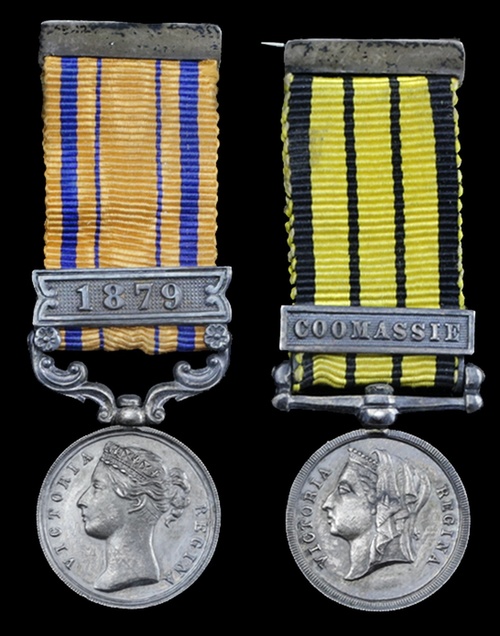
Auction: 19002 - Orders, Decorations and Medals
Lot: 413
The named pair of miniature dress medals worn by Lieutenant-Colonel A. W. Duncan, Royal Artillery, an observer present during the Spanish-Moroccan War 1859-60, who was wounded during an Ashanti attack on the town of Fommanah, which post he commanded, in February 1874, services that won him a ‘mention’ and the Brevet of Major, before being a Battery Commander during the Zulu War, during which he took charge of the Artillery in the advance of Clarke's Flying Column
Ashantee 1873-74, 1 clasp, Coomassie (Captn. & Bt. Major A. W. Duncan. R.A. 1873); South Africa 1877-79, 1 clasp, 1879 (Major A. W. Duncan. R.A. 1879), both individually mounted as worn with silver top riband bars, with a velvet covered board upon which they have been mounted for some considerable time, good very fine (2)
Alexander William Duncan, youngest son of Thomas Duncan, Grenada, was commissioned into the Royal Artillery in April 1856 and first witnessed active service as an Observer with Spanish forces engaged in North Africa in 1860. Advanced to Captain in August 1866, he was next actively employed in the Ashantee War 1873-74, when he served as a Transport Officer and found himself participating in the defence of Fommanah, latterly as C.O. Brackenbury’s Narrative of the Ashantee War takes up the story:
‘On the morning of the 2d [February 1874], he [Colonel Colley] pushed on to Fommanah, and on his arrival found the place warmly attacked on all sides. The post was in command of Captain Steward, 1st W.I.R., who had a garrison of 1 officer and 38 non-commissioned officers and men, 1st West India Regiment; and Lieutenant Grant, 6th Regiment, with 102 of the Mumford company of Russell’s Regiment. There were also present two transport officers - Captain North of the 47th Regiment, and Captain Duncan, R.A. - three surgeons, and two control officers; and in the palace, which was situated in the middle of the main street of the long straggling town, and used as a hospital, were 24 European soldiers and sailors, convalescents. The picquets had reported Ashantis in the neighbourhood early in the morning, and had been reinforced; but the village was far too large to be capable of defence by this small garrison; and when, about 8.30 a.m., the place was attacked from all directions by the enemy, they were able to penetrate into it. Captain North, in virtue of his seniority, assumed the command, but while at the head of his men was shot down in the street of the village, and was obliged by severe loss of blood to hand over the command to Captain Duncan, R.A. The enemy, as has been said, penetrated into all the southern side of the village, which they set on fire; meanwhile the sick from the hospital were removed to the stockade at the north end of the village, which was cleared as rapidly as possible, the houses being pulled down by the troops and labourers acting under Colonel Colley’s orders.
At half-past two Colonel Colley reported as follows: “We have now cleared the greater part of the village, preserving the hospital and store enclosure. Difficult to judge the numbers of the Ashantis; they attack on all sides, and occasional ones creep boldly into the village, but generally keep under cover of the thick bush, which in places comes close to the houses.” The firing ceased about 1 p.m.; but on a party going down for water an hour later, they were hotly fired upon. No further attack was made upon the post. Captain North was severely wounded, dangerously so, and one of the convalescents in the 42d Regiment severely.
Other Europeans were slightly wounded, among them Captain Duncan, R.A., five West Indians, and three privates of Russell’s Regiment. Colonel Colley reported that he would be unable to move any more convoys on from Fommanah for the present.’
Duncan was subsequently mentioned in despatches for his ‘energetic defence of the post’ and given a Brevet Majority.
By the time of his participation in the South Africa operations of 1879, he had attained the substantive rank of Major and command of 'O' Battery, 6th Brigade. The Battery arrived at Durban from England in April 1879, the right half proceeding to the Lower Tugela to form the ammunition column of Crealock’s Division. After getting there, Duncan sent a detachment to Fort Chelmsford to form a separate column, thereby allowing convoys that were proceeding backwards and forwards to be supplied with ammunition at that position, while reserve ammunition could be served at the Tugela to advancing troops. On the forward movement being made by the Division to Port Durnford, the Battery became again united, and Duncan went on to command the artillery in the advance of Clarke’s Flying Column on Ulundi. He returned to Natal following the capture of King Cetshwayo. The Lieutenant-Colonel died on 6 February 1896 at Coates Crescent, Edinburgh.
Subject to 20% VAT on Buyer’s Premium. For more information please view Terms and Conditions for Buyers.
Sold for
£400
Starting price
£180




